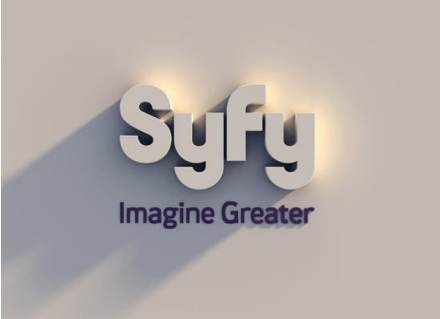 There has been a lot of buzz and recriminations lately about the Sci Fi Channel’s new name change to the SyFy Channel. Yes, the name is kind of weird, alright? It is. I’m sure that some consultants were paid a great deal of money and spent months and months trying to come up with a name that we all find kind of ridiculous.
There has been a lot of buzz and recriminations lately about the Sci Fi Channel’s new name change to the SyFy Channel. Yes, the name is kind of weird, alright? It is. I’m sure that some consultants were paid a great deal of money and spent months and months trying to come up with a name that we all find kind of ridiculous.
But let’s call a spade a spade here, because I believe the real motivation for the name change was something any businessperson should be able to understand: the need to protect your intellectual property and, therefore, your profits. The entertainment industry is a business just like any other. Sure, a lot of us bemoan the fact that stupid, ridiculous, pointless movies are made every single day (*cough*Transformers2*cough*) for no other reason than to make money, but these people are in the business to make money. Should we fault them for that? They need to eat and feed their little entertainment children too. Don’t get me wrong, I’m not saying greed is always good, but let’s recognize that the SyFy network and movie studios are not always making art for art’s sake and recognize that they’re in it to make a profit like everyone else.
Allow me to put my law degree to good use here (yes, I used to practice law) and provide you with some background information on intellectual property law. The fact of the matter is that you cannot trademark the word “sci fi”. It’s too common of a word in the English language and can’t be subject to trademark protection. You can’t trademark a lot of common words, actually. Apparently the phrase “Super Glue” was considered too generic to be trademarked, for example.
I’m not going to speculate on the network’s claim that the name change is an attempt to “broad[en] perceptions and embrac[e] a wider and more diverse range of imagination-based entertainment including fantasy, paranormal, reality, mystery, action and adventure, as well as science fiction”. Frankly, I have no real opinion on that statement because, in all honesty, I still think society’s concept of sci fi has broadened enough in recent years to include most of those characteristics anyways. However, I really do believe that the name change was primarily a business and money-conscious decision to protect their intellectual property. You know why? Because the network still wants you to pronounce “SyFy” as “Sci Fi”. So if they really wanted to distinguish themselves they would have come up with an entirely different name, wouldn’t they?
So what’s the purpose of trademarking your brand? I believe the Iowa State University put it best when they said:
If the owner of a trademark has spent time and money in presenting a service or product to the consumer, the owner should be able to protect this investment by being allowed to prevent others from using the trademark and profiting from the owners investment.
Clearly SyFy has spent time and money in presenting a product and service to its customers: the viewers. So it makes sense that they would want to protect their brand, right? Trademarking their name also allows them to license out the name or collect royalties when other parties use the name.
Consider this little sports story (courtesy of Wikipedia):
Riles & Co., the corporate entity of National Basketball Association (NBA) coach Pat Riley, submitted in November 1988 a trademark application for the use of three-peat on shirts, jackets and hats. At the time, the phrase was being used by members and fans of the Los Angeles Lakers basketball team, of whom Riley was the head coach, regarding the Lakers’ quest that season to obtain what would have been a third successive NBA championship. According to Riley, it was Laker player Byron Scott who coined the term in reference to the team’s goal for that season.
In 1989, Riles & Co. successfully registered the trademark under U.S. Registration Number 1552980. The Lakers did not win a third consecutive NBA championship in 1989, but the Chicago Bulls did in 1993, and Riles & Co. collected royalties from sports apparel makers who licensed the phrase for use on merchandise commemorating that accomplishment.
Smart business sense those NBA guys had, right? Did you also know that every single time the song “Happy Birthday” is sung on television or in a movie that someone gets paid royalties? Trademarking the name SyFy could also allow the network to claim infringement if another network with a similar sounding name came along and attempted to scoop up their viewers. The world is a litigious place, people, so it’s not unrealistic to believe that something like that could occur.
Allow me to share another story with you from my native Canada. Recently, the CBC network chose to stop using the beloved “Hockey Night in Canada” theme song before it’s games because the licensing charge had increased on that song. So they started a national contest for Canadians to write a new song. People complained and stories were written in newspapers. Why couldn’t CBC just pay the license-holder some extra money, people asked. That theme song was more popular than our national anthem, for God sakes! Eventually a winner was selected and now….? No one really cares that much anymore. The new song is played before the games and life goes on.
SyFy will persevere and in five years maybe we’ll still look at the name and snicker (just like I snicker every time I drive by Nipissing because, yes, I am that immature), but no one will really remember the old name or all of the hoopla. I remember when UPN and The WB merged into the CW. The CW is basically the same thing as the WB and the name doesn’t really make much of a difference now (how did they even get the new ‘CW’name anyways?). After all, how many people watch a show exclusively because of the network that it’s on? Do you say to yourselves “Well, Lost is on ABC, but if it was on NBC I wouldn’t watch it”? Of course you don’t. So should we expect that people will really stop watching a show they like just because the network switched some “i”s for “y”s?
I’m not going to pass judgement on the current lineup of SyFy’s shows, because I don’t actually watch most of them. I have no real opinion regarding the complaints of many people that they’re actually more upset with the current slate of shows than the actual name change (although, admittedly, most of them don’t like the name change either). In the meantime, let’s just see if the new SyFy network can successfully rebrand itself.
 Follow Us
Follow Us






I couldn't agree with you more Clarissa.nbsp; I've been saying this for weeks.nbsp; Makes perfect business sense.nbsp; Even if it does, otherwise, seem a bit stupid.
I couldn’t agree with you more Clarissa.nbsp; I’ve been saying this for weeks.nbsp; Makes perfect business sense.nbsp; Even if it does, otherwise, seem a bit stupid.